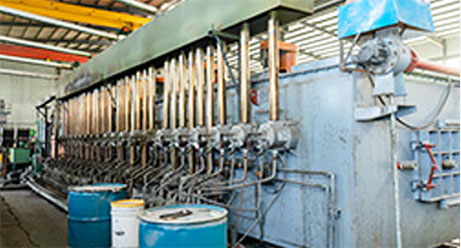

m33 washer
Dis . 06, 2024 22:45 Back to list
m33 washer
Understanding the M33 Washer A Comprehensive Guide
In the world of fastening and assembly, washers play a critical role, often overlooked but essential for ensuring the integrity and durability of joints and connections. Among the various types of washers available in the market, the M33 washer stands out due to its unique specifications and applications. This article delves into the characteristics, uses, and advantages of the M33 washer, providing a detailed exploration for engineers, designers, and DIY enthusiasts.
What is an M33 Washer?
The term M33 washer typically refers to a specific measurement and type of washer that is compatible with M33 bolts or screws. The M denotes the metric system, while 33 specifies the nominal diameter of the bolt in millimeters. The 20 might refer to the thickness or specific type of washer, indicating its suitability for certain applications. Washers are primarily used to distribute the load of a threaded fastener, preventing damage to the surface material and ensuring a secure assembly.
Types of M33 Washers
There are various types of washers that may fall under the M33 category. The most common types include
1. Flat Washers These are the most basic type of washers, providing a smooth surface that distributes the load across a wider area. They help in preventing damage to the surface and reduce the risk of the bolt or screw loosening due to vibration.
2. Lock Washers These washers are designed to prevent loosening under load. They are often used in applications where vibrations are a concern, such as in automotive or industrial machinery.
3. Spring Washers These washers provide additional tension and can absorb shocks or vibrations. They are especially useful in applications where components are subject to movement.
4. Fender Washers These have a larger outer diameter compared to standard flat washers, increasing the surface area that comes into contact with the material being fastened. They are useful for distributing the load over a larger area to prevent pull-through.
Materials and Coatings
M33 washers can be manufactured from a variety of materials, depending on the application requirements. Common materials include
- Steel Often coated with zinc or other finishes to prevent corrosion, steel washers are durable and suitable for many general-purpose applications.
- Stainless Steel Ideal for environments that are exposed to moisture or corrosive substances. Stainless steel washers provide excellent resistance to rust and corrosion.
- Plastic Used in applications where electrical insulation is necessary or where lightweight and rust-free components are preferred.
m33 washer

- Rubber These provide excellent sealing properties and can absorb shock, making them suitable for specific applications that require both fastening and sealing.
Applications of M33 Washers
M33 washers are versatile and find applications across various industries including
- Automotive In vehicle assembly, M33 washers are critical for securing components and preventing loosening due to vibrations from the engine.
- Construction Used in steel beams and structural components, these washers ensure that load-bearing connections are secure and reliable.
- Manufacturing Essential for the assembly of machinery and equipment, they help in maintaining alignment and preventing wear.
- Electronics In certain electronic devices, they can provide insulation as well as support, helping to maintain the integrity of sensitive components.
Advantages of Using M33 Washers
The use of M33 washers comes with several advantages
- Load Distribution They spread the load of a fastener, reducing the stress on the material and preventing damage.
- Vibration Resistance Certain types of washers, such as lock washers, are specifically designed to resist loosening caused by vibrations.
- Durability Depending on the material, these washers can offer significant longevity, reducing the need for maintenance and replacements.
- Cost-Effectiveness By preventing damage and ensuring a proper connection, washers can save on costs related to repairs and replacements over time.
Conclusion
The M33 washer may seem like a small component in the grand scheme of fastening technologies, but its importance cannot be overstated. Understanding its characteristics, types, materials, and applications is crucial for anyone involved in mechanical assembly, construction, or manufacturing. By utilizing the right M33 washer in your projects, you can ensure safety, reliability, and longevity in your assemblies, making it a worthy investment for any engineer or craftsman.
Latest news
-
Hot Dip Galvanized Bolts-About LongZe|High Strength, Corrosion Resistance
NewsJul.30,2025
-
High-Strength Hot Dip Galvanized Bolts - Hebei Longze | Corrosion Resistance, Customization
NewsJul.30,2025
-
Hot Dip Galvanized Bolts-Hebei Longze|Corrosion Resistance&High Strength
NewsJul.30,2025
-
High-Strength Hot-Dip Galvanized Bolts-Hebei Longze|Corrosion Resistance&High Strength
NewsJul.30,2025
-
Hot Dip Galvanized Bolts-Hebei Longze|Corrosion Resistance&High Strength
NewsJul.30,2025
-
Hot Dip Galvanized Bolts - Hebei Longze | Corrosion Resistance, High Strength
NewsJul.30,2025

